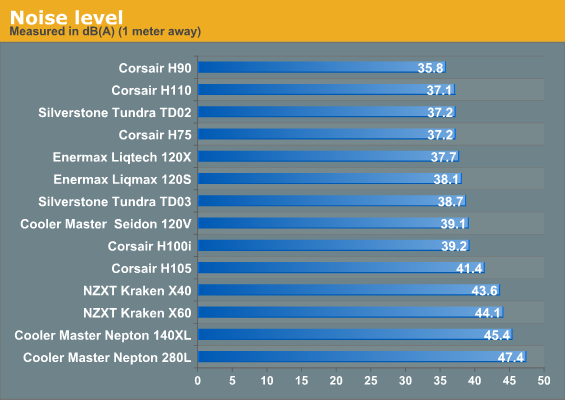Closed Loop AIO Liquid Coolers: 14-way Mega Roundup Review
by E. Fylladitakis on February 12, 2014 7:00 AM ESTTesting Results, Low Fan Speed (7V)









After dropping the voltage of the fans down to 7V, the characteristic performance of several AIO coolers changes quite a bit. As expected, the performance gap between most single and dual fan radiator models widens, as the larger surface maintains a greater heat dissipation rate as the flow rate decreases. The charts are once again led by Cooler Master's Nepton coolers, although that hardly qualifies as "low noise testing" as both coolers still generate high noise levels and are most definitely unsuitable for a low noise environment.
Corsair's H110 displays tremendous thermal performance under very heavy load, in conjunction with very low noise levels. NZXT's Kraken X60 delivers about the same thermal performance, which was to be expected as it virtually is the same design, yet the noise levels are significantly higher; apparently, Corsair chose their fans a bit more wisely (or they just got lucky). Silverstone's Tundra TD02 also fares considerably better this time, rivaling the high load thermal performance of all other 240mm coolers at considerably lower noise levels. Under low thermal loads, the Tundra TD02 manages to outperform most of the dual 120mm and 140mm coolers. Apparently, the large and thick radiator of the TD02 allows it to maintain high performance figures even when the airflow is reduced.
Those who are interested only in noiseless operation and are looking at AIO coolers as a high-performance, low noise alternative to CPU coolers should be careful with their selections. It is not always possible to reduce the speed of the stock fans or replace them in order to reduce the noise generated by the kit. For example, the fan of the Cooler Master Seidon 120V is virtually noiseless when its voltage is dropped down to 7V; the pump however is not, making a clearly audible, high pitch noise. This is also true for the Enermax Liqmax 120S, as the pump of this kit makes a whining noise as well, although the noise of its pump is significantly lower. On the other hand, the Corsair H90 is not the best performing or, due to its size, the most convenient kit of the roundup, yet it is entirely silent when its fan's voltage is reduced down to 7 Volts.










139 Comments
View All Comments
zodiacfml - Thursday, February 13, 2014 - link
Nice job. I like the various loads given to the coolers. Unfortunately, my interest in liquid coolers becomes less as Intel has been lowering the TDP of their CPUs.prateekprakash - Thursday, February 13, 2014 - link
I only wished they'd included Swiftech's H220 and H320 (Even though they aren't available in the US, but I've have been using H220 in my system here in India)buffhr - Thursday, February 13, 2014 - link
Why wasnt the swiftech H220 included in this list? Would of been really nice to see it stack up against 340W and well it is an AIO and meets up with the same price range as well.Rob94hawk - Sunday, February 16, 2014 - link
Because the H220 is a piece of crap due to mass pump failure. I'm on my 3rd one within warranty and I haven't even put it on yet. I have the stock cooler on my 4770k. That's how much confidence I have in the Swiftech H220.Suuave - Thursday, February 13, 2014 - link
A very interesting article but I have a suggestion of one thing would have definitely made it better - a chart. Give us a simple visual reference of "potential cooling performance" vs "noise level" vs "unit size" vs "price" that would give everyone a quick reference of the overall values for the features they are looking for in a sealed system.vgray35@hotmail.com - Thursday, February 13, 2014 - link
What we sorely need is a table of computer cases with a list of water coolers that fit into each case. A valuable reference that does not exist anywhere as far as I know. The reviewers are in the best position with their knowledge to provide such a table.Hrel - Thursday, February 13, 2014 - link
Would have been great if you guys could have included 1-3 air coolers in this review. For comparison.If you don't overclock and primarily care about noise liquid coolers make no sense at all. My air cooler never exceeds 16db. Apparently 36db is the lowest any of these go. That's simply TERRIBLE.
The PC Apologist - Thursday, February 13, 2014 - link
Would have been great if you read through the comments section...Just saying.
Daeros - Thursday, February 13, 2014 - link
This is really bothering me; this article strongly implies that sound pressure equates linearly to to loudness. The decibel scale is logarithmic, true, but while 3db is roughly a doubling in sound energy, it is the smallest difference reliably discernible as louder by people. It takes roughly a 10db increase in sound pressure to have a doubling in perceived loudness. In the example, the 30db difference would be perceived as (roughly) 8 times louder (3 doublings), not 1000 times louder (even though it may be 1000x as much energy).cactusdog - Friday, February 14, 2014 - link
I don't understand why cooler reviews are done with different speed fans, it makes no sense for comparison.